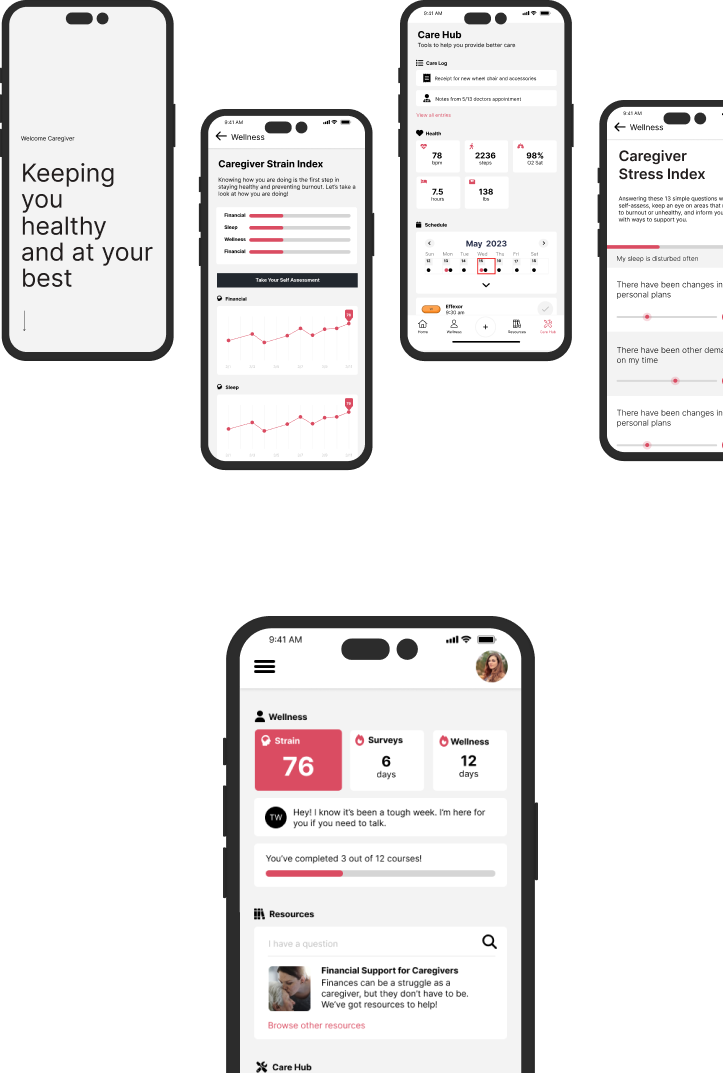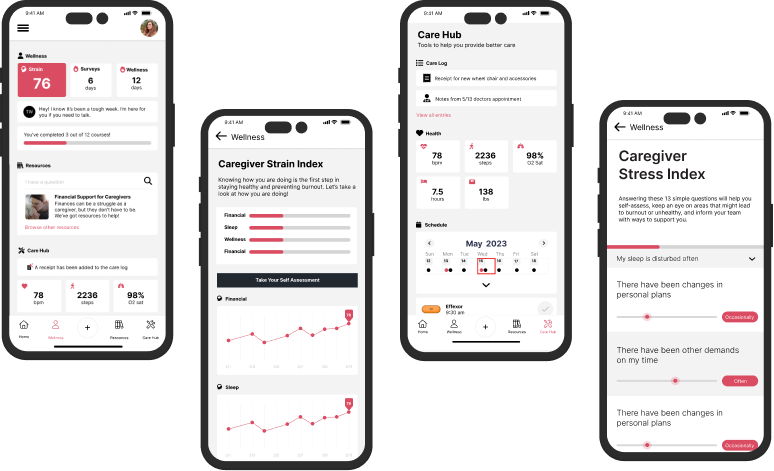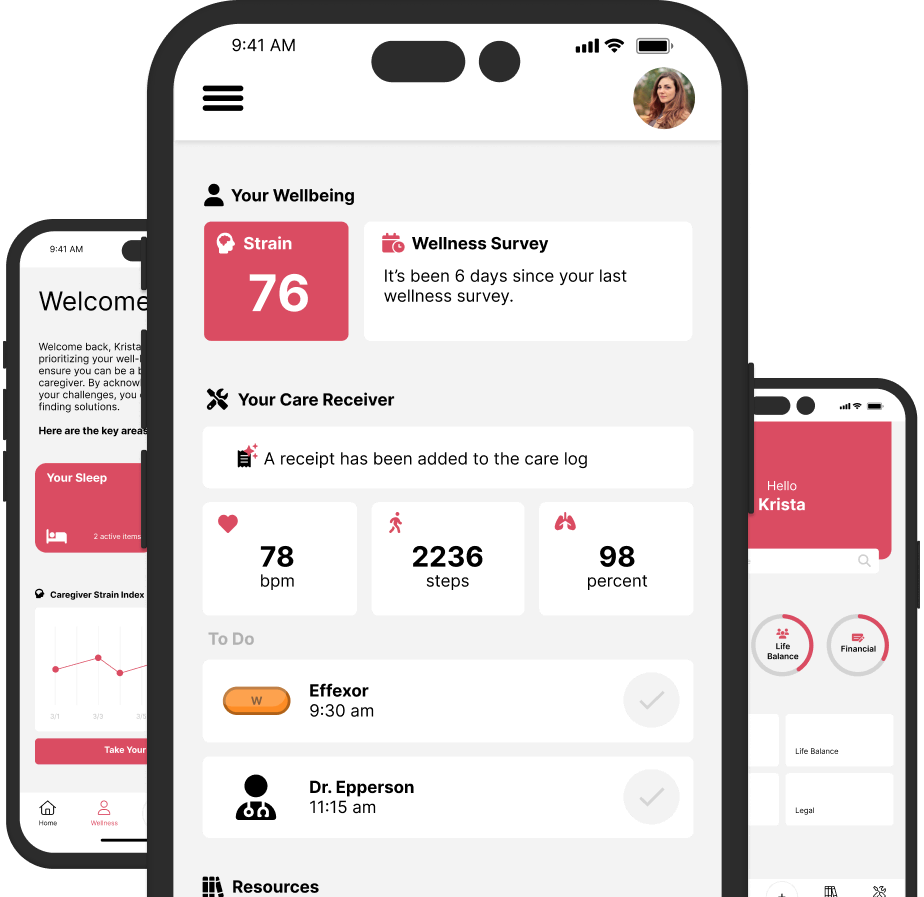Health Plans
Address the White House's caregiver executive order, elevate standards, enhance your CMS star rating, and tackle the unpaid caregiver issue.
Introducing the Avanlee app: the comprehensive caregiver app for self-care, resource support, and remote monitoring for aging parents.

29% of your members are unpaid family caregivers
Health plans should provide better support for caregivers.
More than 65 million people, 29% of the U.S. population, provide care for a chronically ill, disabled, or aged family member or friend during any given year. They spend an average of 20 hours per week providing care for their loved one.
Lead the Industry.
See how the Avanlee app can bring relief to your members and increase ratings.
Empowering family caregivers with essential resources and support.
Added Value
Higher CMS score and membership retention through additional care coordination resources elevates positive customer satisfaction, addresses prevention, and includes 24/7 responsiveness
Affordable medications
Prescription adherence to reduce unnecessary doctor visits
Care receivers remain happy and safe at home longer
A trusted source for caregiving minimizes mental health challenges
Enhancing care continuity reduces EMR admissions and doctor visits, resulting in fewer claims
Reduce emotional distress, isolation, or loneliness through the assistance of a support team
Features
Caregiver
- Wellness & self-care management system with Caregiver Strain Index
- Training and skill development guides
- Assemble and activate personalized support team
Care receiver
- Walmart shopping & delivery
- Biometric monitoring & alerts
- Event scheduling
- Medication tracking
- Build a team of trusted advocates


Caregivers need your Health Plan to step up and help them in their journey.
The rapidly aging global population, coupled with increasing chronic disease prevalence, has magnified the role of unpaid family caregivers in the healthcare continuum. These caregivers, often juggling their personal and professional lives, have become the silent backbone of long-term patient care outside the hospital setting. However, their integral contributions often go unrecognized, leaving them without necessary resources and support.
The urgency for health plans to provide enhanced options and benefits for these caregivers is undeniable. Without strategic intervention, not only do caregivers face escalating physical, emotional, and financial burdens, but the quality of care provided to the patient may also decline, leading to heightened healthcare costs and poorer health outcomes in the long run.
A significant portion of the population are caregivers.
According to the National Alliance for Caregiving and AARP, about 53 million adults in the U.S. (or over 20% of the adult population) have provided unpaid care to an adult or child in the last 12 months.
Many caregivers provide long-term care.
A significant percentage of caregivers have been providing care for 5 years or more. This long-term commitment often leads to increased physical, emotional, and financial strain.
Caregiving can have negative health implications.
Studies have shown that long-term caregiving, especially without adequate support, can lead to increased stress, depression, and physical health issues among caregivers.
Caregiving frequently leads to financial burdens and workplace disruptions.
Caregivers often incur out-of-pocket expenses and must adjust their work schedules, sometimes even quitting their jobs due to their responsibilities.
$3 per member: A small investment, a massive caregiver transformation.
Nurture caregivers through robust support.
Empower caregivers with the right expertise.
Offer tools that simplify caregiving tasks.
Boost your member benefits with the essential addition of caregiver support!
Stress Levels: According to the National Alliance for Caregiving and AARP, approximately 40% of caregivers report feeling emotionally stressed due to their role.
Physical Health: A study from the "Caregiving in the U.S." report found that about one in four family caregivers view their health as fair to poor.
Depression: It's estimated that between 40-70% of caregivers show symptoms of clinical depression, with roughly a quarter to half of these caregivers meeting the diagnostic criteria for major depression.
Lack of Self-Care: According to the Family Caregiver Alliance, caregivers often prioritize the health of the person they're caring for over their own, neglecting their personal health needs.
Sleep Deprivation: The AARP notes that many caregivers report problems with sleeping, often resulting from stress or being on-call for the care recipient during the night.
Financial Strain: About 36% of caregivers report having a moderate to high degree of financial strain due to their role, as per a study from the "Caregiving in the U.S." report.
Workplace Challenges: Nearly 70% of working caregivers suffer work-related difficulties due to their dual roles, according to the Family Caregiver Alliance.
Lack of Training: The AARP found that many caregivers perform medical and nursing tasks with little or no training, leading to feelings of overwhelm and uncertainty.
Time Commitment: On average, caregivers spend about 24.4 hours a week providing care, often leading to exhaustion, as per data from the National Alliance for Caregiving and AARP.
Social Isolation: Caregivers often report feeling socially isolated due to a lack of time or energy to engage in social activities, with studies indicating that caregivers have a 50% higher risk of experiencing feelings of loneliness compared to non-caregivers.
Caregiver Video Series
Watch StoriesRequest a Demo

Avanlee Care is on a mission to change how we care for our aging population.

download & setup in minutes







